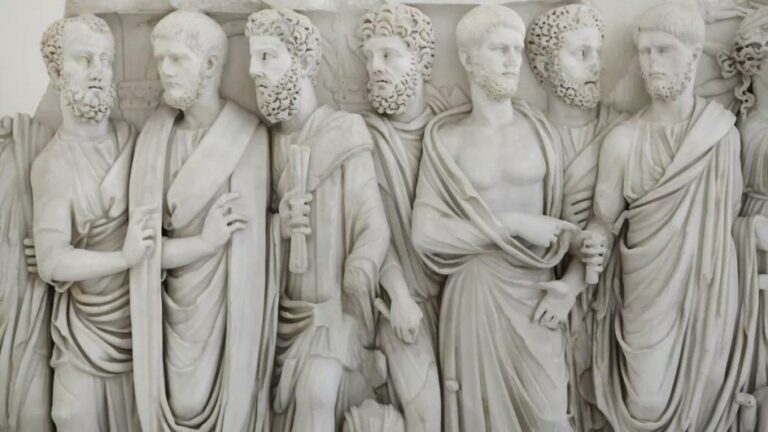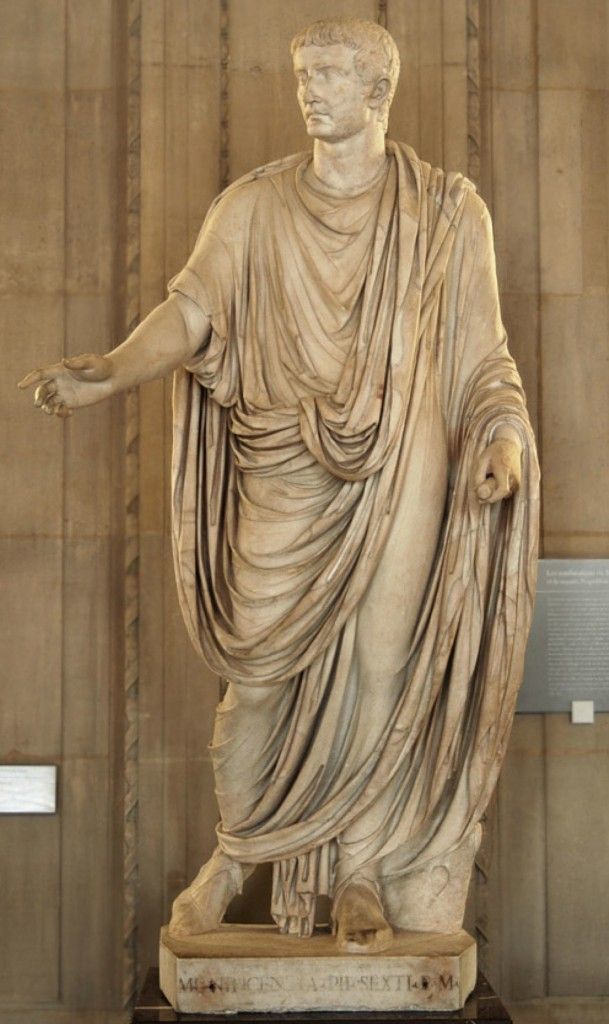Meaning of Publius
Roman Nomenclature
Publius is a Roman praenomen, which is the first name in ancient Roman naming conventions. It holds significant historical weight and reveals much about Roman society and culture.
The origins of the name Publius are uncertain. Some scholars suggest it may be connected to the Latin word “publicus,” meaning “public” or “common.” This association might imply a connection to the state or a sense of belonging to the broader community.
Another theory links Publius to the Etruscan word “puvli,” possibly referring to a type of sacrificial offering. Etruscan influence was pervasive in early Rome, and this connection suggests potential religious connotations associated with the name.
Regardless of its precise etymology, Publius gained prominence during the Roman Republic. It became a common praenomen for patricians, the elite class who held political power and influence.
Famous Romans bearing the name Publius include Publius Cornelius Scipio Africanus, the renowned general who defeated Hannibal in the Second Punic War; Publius Ovidius Naso, the celebrated poet known for his works such as “Metamorphoses”; and Publius Vergilius Maro, better known simply as Virgil, the epic poet who composed “The Aeneid.” These individuals exemplify the name’s association with intellectual brilliance, military prowess, and cultural achievements.
As Roman society evolved, the use of praenomina gradually declined in daily life. However, Publius continued to hold historical significance as a symbol of ancient Rome’s republican era, representing its values, traditions, and influential figures.
Significance as a Praenomen
Publius is a Latin praenomen, which was one of the three main personal name categories used in ancient Roman society.
Meaning:
The precise meaning of Publius is uncertain, though most scholars believe it derives from the Latin word “populus,” meaning “people” or “public.”
Significance as a Praenomen:
Praenomina were hereditary and often reflected family lineage. Publius was a common praenomen among the patrician class, the traditional aristocratic families of Rome.
Origins and History:
The use of Publius as a praenomen can be traced back to the early Roman Republic (509-27 BC).
Famous Romans bearing the name Publius:
- Publius Cornelius Scipio Africanus: The celebrated general who defeated Hannibal at the Battle of Zama in 202 BC.
- Publius Ovidius Naso: A renowned poet best known for his work “The Metamorphoses.”
- Publius Vergilius Maro (Virgil): An epic poet, author of the famous Aeneid.
Cultural Impact:
The name Publius continues to be recognized today as a symbol of Roman history and culture. It has occasionally been adopted by individuals outside of Italy as a first or middle name.
Origin of Publius
Patrician Roots
Publius is a Roman praenomen, a personal name used primarily during the Roman Republic.
Its origins are deeply intertwined with the patrician class, the elite group that held significant political and social power in ancient Rome.
The meaning of Publius is debated among scholars. Some believe it may be derived from the Latin words “pubes” or “publicus,” meaning “public” or “common.” Others suggest a connection to the verb “pubeo,” meaning “to bloom” or “to mature.”
This uncertainty reflects the complexity of etymological research and the limited surviving records from early Roman history.
However, the association with patrician families is well-established.
Here are some key points about Publius and its connection to the patricians:
- Prevalence among Patricians: The name Publius was notably common among Roman patrician families. Prominent figures like Publius Cornelius Scipio Africanus, known for his military victories against Hannibal, and Publius Ovidius Naso, the famed poet, bore this praenomen.
- Limited Use by Plebeians: While not entirely absent from plebeian families, the use of Publius was far less frequent among the common people. This reflects the social hierarchy of ancient Rome and the tendency for aristocratic names to be inherited and perpetuated within elite circles.
- Symbol of Status: The praenomen Publius served as a marker of social standing and lineage, signifying membership in one of Rome’s most influential families.
The name Publius embodies the legacy of Roman patricians. Its meaning may be elusive, but its historical significance is undeniable. It stands as a testament to the enduring influence of family tradition, social hierarchy, and cultural identity in ancient Rome.
Connection to the Claudii
Publius is a Latin praenomen, which is equivalent to our modern understanding of a given name. It holds deep roots in Roman history, with its origins tracing back to the archaic period. While the precise meaning of Publius remains debated among scholars, several theories exist.
One prevalent theory suggests that Publius is derived from the Latin word “populus,” meaning “people” or “public.” This interpretation aligns with the Roman tradition of naming prominent figures after their clan’s patron deity. Publius could have been associated with a deity related to the public sphere or communal well-being.
Another theory connects Publius to the verb “publicare,” meaning “to make public” or “to proclaim.” This notion suggests that Publius might have signified someone who was destined for prominence, whose achievements would be widely known and celebrated.
The Claudii were a prominent patrician family in ancient Rome, renowned for their political influence and military prowess. Publius became a common praenomen within the Claudia gens (clan) throughout its history.
Several notable figures from the Claudian family bore the name Publius, including Publius Claudius Pulcher (consul in 249 BCE), known for his successful naval campaigns, and Publius Claudius Tacitus (historian), whose writings offer invaluable insights into Roman society and history.
The prevalence of Publius within the Claudian clan underscores the family’s adherence to traditional naming conventions. It suggests a strong sense of identity and connection to their patrician heritage.
Historical Usage of Publius
Prominent Figures in Roman History
The name Publius is a Roman *praenomen*, one of the personal names given to individuals in ancient Rome.
It was originally a family name, adopted by several prominent patrician families throughout the Republican and Imperial periods. The significance of the name likely lies in its association with *public service* and *civic duty*.
During the Roman Republic, many distinguished figures bore the *praenomen* Publius, including:
• **Publius Cornelius Scipio Africanus** (236-183 BCE), the celebrated general who defeated Hannibal in the Second Punic War.
• **Publius Cato the Elder** (234-149 BCE), a renowned orator, statesman, and writer known for his conservatism and strict morals.
• **Publius Cicero** (106-43 BCE), perhaps the most celebrated Roman orator and philosopher, whose writings remain influential today.
The name’s prominence continued during the Roman Empire with figures like:
• *Publius Aelius Hadrianus*** (76-138 CE), better known as Emperor **Hadrian**, renowned for his architectural accomplishments and administrative reforms.
• *Publius Septimius Geta*** (189-211 CE), co-emperor with Caracalla, whose short reign was marred by instability and conflict.
The continued usage of the name *Publius* throughout Roman history highlights its enduring significance within Roman society. It served as a mark of distinction, often associated with leadership, intelligence, and commitment to the public good.
Decline and Resurgence in Later Eras
Publius is a Latin personal name with a rich and complex history spanning centuries. Its usage ebbed and flowed, reflecting cultural trends and societal changes.
In ancient Rome, Publius was a common cognomen, frequently found among the patrician class. It likely derived from the Latin word “publicus,” meaning “public” or “belonging to the people.” This association with the public sphere may have been linked to the importance of civic duty and political involvement in Roman society.
Prominent figures bearing the name Publius include:
- Publius Cornelius Scipio Africanus, a renowned general who defeated Hannibal at the Battle of Zama.
- Publius Ovidius Naso, a celebrated poet known for his works like “The Art of Love” and “Metamorphoses.”
- Publius Vergilius Maro, better known as Virgil, the epic poet who wrote “The Aeneid.”
After the fall of the Western Roman Empire, the use of Publius declined significantly. Latin’s influence waned across Europe, and traditional Roman names fell out of fashion.
However, a resurgence occurred during the Renaissance. As interest in classical antiquity revived, Publius experienced a renewed popularity. Humanists sought inspiration from Roman culture, and the name once again appeared among notable individuals.
Today, Publius remains a relatively uncommon name, but it continues to carry a sense of history and connection to the ancient world. Its association with intellectualism and civic virtue makes it an appealing choice for those who value these qualities.
- Best LeadsGorilla Alternatives for 2025 - April 26, 2025
- Best Overloop Alternatives for 2025 - April 25, 2025
- Best Lead411 Alternatives for 2025 - April 25, 2025


